Written Samples
15 sample cover letters for career change.
Are you feeling stuck in your current career and yearning for a change?
Transitioning to a new field can be an exciting yet challenging journey.
One of the most critical components of a successful career change is crafting a compelling cover letter that showcases your transferable skills and passion for your new chosen path.

Sample Cover Letters for Career Change
In this article, we present fifteen sample cover letters designed to inspire and guide you through the process of writing your career change cover letter.
From highlighting relevant experiences to expressing enthusiasm for new opportunities, these examples will help you make a strong case for your career transition.
Cover Letter 1: From Marketing to Education
Subject: Passionate Marketer Seeking Teaching Position
Dear Hiring Manager,
With five years of experience in marketing and a lifelong passion for education, I am excited to apply for the position of English Teacher at Oakwood High School. Throughout my marketing career, I have honed my communication, presentation, and interpersonal skills, which I believe will translate seamlessly into the classroom setting.
In addition to my professional experience, I have spent the past two years volunteering as a tutor at my local community center, working with students of various ages and backgrounds. This experience has solidified my desire to pursue a career in education and make a positive impact on the lives of young learners.
I am confident that my unique combination of skills, experience, and passion for teaching will enable me to become a valuable member of the Oakwood High School faculty. I look forward to the opportunity to discuss how I can contribute to your school’s mission of providing exceptional education to every student.
Thank you for your consideration.
Cover Letter 2: From Finance to Non-Profit
Subject: Finance Professional Seeking Non-Profit Opportunity
As a finance professional with over a decade of experience in the corporate world, I have reached a point in my career where I am seeking to align my work with my values and make a meaningful difference in society. When I came across the Program Coordinator position at Habitat for Humanity, I knew it was the perfect opportunity to leverage my skills and experience for a cause I am truly passionate about.
Throughout my career in finance, I have developed strong project management, budgeting, and organizational skills, which I believe will be invaluable in coordinating Habitat for Humanity’s building projects and volunteer efforts. Additionally, my experience in data analysis and reporting will allow me to effectively track and communicate the impact of the organization’s work to stakeholders.
I am excited about the prospect of bringing my skills and enthusiasm to Habitat for Humanity and contributing to the organization’s mission of providing affordable housing to families in need. I would welcome the opportunity to discuss further how my unique background and passion for social impact can benefit your team.
Thank you for your time and consideration.
Cover Letter 3: From Healthcare to Technology
Subject: Healthcare Professional Transitioning to Tech
As a healthcare professional with seven years of experience in patient care and management, I have developed a keen interest in the intersection of healthcare and technology. The Product Manager position at MediTech Solutions presents an exciting opportunity for me to combine my healthcare background with my passion for innovation and problem-solving.
In my current role as a Nurse Manager, I have led cross-functional teams in implementing new patient care protocols and streamlining processes, resulting in improved patient outcomes and increased efficiency. These experiences have honed my ability to collaborate with diverse stakeholders, manage complex projects, and drive results, skills that I believe are directly transferable to the product management role.
Additionally, I have taken the initiative to expand my knowledge of the healthcare technology landscape through online courses and attending industry conferences. This self-driven learning has equipped me with a strong understanding of the challenges and opportunities in the field, and I am eager to apply this knowledge to developing innovative solutions at MediTech Solutions.
I am confident that my unique combination of healthcare expertise and passion for technology will enable me to make valuable contributions to your product development team. I would welcome the opportunity to discuss further how my skills and experiences can support MediTech Solutions’ mission of revolutionizing patient care through cutting-edge technology.
Sarah Johnson
Cover Letter 4: From Sales to Human Resources
Subject: Sales Professional Transitioning to HR
With ten years of experience in sales and a growing passion for people development, I am excited to apply for the Human Resources Generalist position at ABC Company. Throughout my sales career, I have consistently demonstrated strong interpersonal skills, empathy, and the ability to build and maintain relationships, which I believe are essential qualities for success in human resources.
In my current role as a Sales Manager, I have taken on increasing responsibilities in recruiting, onboarding, and mentoring new team members. These experiences have not only deepened my understanding of the employee lifecycle but also ignited my desire to make a full transition into the human resources field.
To further prepare for this career change, I have completed a Professional in Human Resources (PHR) certification program, which has provided me with a solid foundation in HR principles and best practices. I am eager to apply this knowledge and my transferable skills to support ABC Company’s talent management and employee engagement initiatives.
I am confident that my unique combination of sales experience, people skills, and HR education will enable me to make valuable contributions to your human resources team. I would welcome the opportunity to discuss further how my background and passion for people development can support ABC Company’s goals and objectives.
Michael Brown
Cover Letter 5: From Engineering to Project Management
Subject: Engineer Seeking Project Management Role
As a mechanical engineer with eight years of experience in product development and cross-functional collaboration, I am excited to apply for the Project Manager position at XYZ Corporation. Throughout my engineering career, I have consistently demonstrated strong problem-solving, communication, and leadership skills, which I believe are directly transferable to the project management role.
In my current position as a Senior Mechanical Engineer, I have successfully led multi-disciplinary teams in delivering complex projects on time and within budget. These experiences have honed my ability to manage competing priorities, communicate effectively with stakeholders, and drive results, skills that are essential for success in project management.
Additionally, I have taken the initiative to expand my knowledge of project management methodologies and best practices through self-study and attending workshops. This ongoing learning has equipped me with a strong understanding of the tools and techniques used in effective project management, and I am eager to apply this knowledge to support XYZ Corporation’s project initiatives.
I am confident that my unique combination of engineering expertise, leadership skills, and passion for project management will enable me to make valuable contributions to your team. I would welcome the opportunity to discuss further how my background and experience can support XYZ Corporation’s goals and objectives.
Emily Davis
Cover Letter 6: From Journalism to Public Relations
Subject: Journalist Transitioning to Public Relations
As a journalist with five years of experience in crafting compelling stories and engaging audiences, I am excited to apply for the Public Relations Specialist position at ABC Agency. Throughout my journalism career, I have honed my writing, research, and communication skills, which I believe are directly transferable to the public relations field.
In my current role as a Staff Writer for The Daily Times, I have consistently demonstrated the ability to identify newsworthy angles, conduct thorough research, and craft persuasive narratives that capture readers’ attention. These skills, combined with my strong media relationships and understanding of the ever-evolving digital landscape, position me well to succeed in a public relations role.
To further prepare for this career transition, I have completed a Professional Certificate in Public Relations, which has provided me with a solid foundation in PR strategies, crisis communication, and media relations. I am eager to apply this knowledge and my transferable skills to support ABC Agency’s clients in building and maintaining positive brand reputations.
I am confident that my unique combination of journalism experience, storytelling skills, and passion for public relations will enable me to make valuable contributions to your team. I would welcome the opportunity to discuss further how my background and creative approach can support ABC Agency’s goals and objectives.
David Thompson
Cover Letter 7: From Customer Service to Event Planning
Subject: Customer Service Pro Seeking Event Planning Role
With seven years of experience in customer service and a passion for creating memorable experiences, I am excited to apply for the Event Coordinator position at XYZ Events. Throughout my customer service career, I have consistently demonstrated strong organizational, problem-solving, and interpersonal skills, which I believe are directly transferable to the event planning field.
In my current role as a Customer Service Supervisor, I have successfully led teams in managing high-volume customer inquiries, resolving complex issues, and ensuring customer satisfaction. These experiences have honed my ability to manage multiple tasks, communicate effectively with diverse stakeholders, and maintain a keen attention to detail, skills that are essential for success in event planning.
Additionally, I have taken on increasing responsibilities in planning and executing employee engagement events and customer appreciation initiatives. These experiences have fueled my passion for event planning and deepened my understanding of the logistics and coordination required to bring successful events to life.
I am confident that my unique combination of customer service expertise, organizational skills, and enthusiasm for event planning will enable me to make valuable contributions to the XYZ Events team. I would welcome the opportunity to discuss further how my background and creative approach can support your company’s mission of creating unforgettable experiences for clients.
Jennifer Wilson
Cover Letter 8: From Graphic Design to UX/UI Design
Subject: Graphic Designer Transitioning to UX/UI
As a graphic designer with five years of experience in creating visually compelling and user-friendly designs, I am excited to apply for the UX/UI Designer position at ABC Tech. Throughout my design career, I have consistently demonstrated strong problem-solving, collaboration, and user-centric thinking skills, which I believe are directly transferable to the UX/UI design field.
In my current role as a Senior Graphic Designer, I have successfully led design projects from concept to completion, collaborating closely with cross-functional teams to ensure that design solutions align with user needs and business objectives. These experiences have honed my ability to conduct user research, create wireframes and prototypes, and iterate based on user feedback, skills that are essential for success in UX/UI design.
To further prepare for this career transition, I have completed a UX/UI Design Bootcamp, which has provided me with hands-on experience in user research, information architecture, interaction design, and usability testing. I am eager to apply this knowledge and my transferable skills to create intuitive and engaging user experiences at ABC Tech.
I am confident that my unique combination of graphic design expertise, user-centric approach, and passion for UX/UI design will enable me to make valuable contributions to your product development team. I would welcome the opportunity to discuss further how my background and creative problem-solving skills can support ABC Tech’s mission of creating innovative and user-friendly digital solutions.
Amanda Parker
Cover Letter 9: From Accounting to Data Analysis
Subject: Accountant Transitioning to Data Analysis
As an accountant with seven years of experience in financial analysis and reporting, I am excited to apply for the Data Analyst position at XYZ Corporation. Throughout my accounting career, I have consistently demonstrated strong analytical, problem-solving, and data visualization skills, which I believe are directly transferable to the data analysis field.
In my current role as a Senior Accountant, I have successfully led projects in financial modeling, forecasting, and data-driven decision-making. These experiences have honed my ability to collect, analyze, and interpret complex data sets, and communicate insights to stakeholders, skills that are essential for success in data analysis.
To further prepare for this career transition, I have completed a Data Science Certificate program, which has provided me with hands-on experience in statistical analysis, data mining, and machine learning. I am eager to apply this knowledge and my transferable skills to support XYZ Corporation’s data-driven initiatives and drive business growth.
I am confident that my unique combination of accounting expertise, analytical skills, and passion for data analysis will enable me to make valuable contributions to your data science team. I would welcome the opportunity to discuss further how my background and data-driven approach can support XYZ Corporation’s mission of leveraging data to drive innovation and competitive advantage.
Robert Johnson
Cover Letter 10: From Operations to Consulting
Subject: Operations Manager Seeking Consulting Role
As an operations manager with ten years of experience in process improvement and change management, I am excited to apply for the Management Consultant position at ABC Consulting. Throughout my operations career, I have consistently demonstrated strong strategic thinking, problem-solving, and leadership skills, which I believe are directly transferable to the consulting field.
In my current role as an Operations Manager, I have successfully led cross-functional teams in implementing process improvements, driving operational efficiency, and managing organizational change. These experiences have honed my ability to analyze complex business challenges, develop data-driven solutions, and influence stakeholders, skills that are essential for success in consulting.
To further prepare for this career transition, I have completed an MBA program with a focus on strategy and management. This education has provided me with a strong foundation in business strategy, financial analysis, and leadership, and I am eager to apply this knowledge to help ABC Consulting’s clients solve their most pressing business challenges.
I am confident that my unique combination of operations expertise, strategic thinking, and passion for consulting will enable me to make valuable contributions to your team. I would welcome the opportunity to discuss further how my background and problem-solving skills can support ABC Consulting’s mission of driving business transformation and growth for clients.
Elizabeth Thompson
Cover Letter 11: From Teaching to Instructional Design
Subject: Teacher Transitioning to Instructional Design
As a teacher with eight years of experience in curriculum development and student engagement, I am excited to apply for the Instructional Designer position at XYZ eLearning. Throughout my teaching career, I have consistently demonstrated strong content creation, instructional planning, and learner-centric thinking skills, which I believe are directly transferable to the instructional design field.
In my current role as a High School English Teacher, I have successfully designed and implemented engaging lesson plans, incorporated technology into the classroom, and differentiated instruction to meet diverse learner needs. These experiences have honed my ability to create effective learning experiences, align content with learning objectives, and assess learner performance, skills that are essential for success in instructional design.
To further prepare for this career transition, I have completed a Master’s degree in Instructional Design and Technology, which has provided me with a strong foundation in learning theories, instructional strategies, and eLearning development tools. I am eager to apply this knowledge and my transferable skills to create impactful and engaging learning solutions at XYZ eLearning.
I am confident that my unique combination of teaching expertise, instructional design skills, and passion for creating effective learning experiences will enable me to make valuable contributions to your team. I would welcome the opportunity to discuss further how my background and learner-centric approach can support XYZ eLearning’s mission of delivering high-quality, engaging, and effective online learning solutions.
Sarah Davis
Cover Letter 12: From Social Work to Human Resources
Subject: Social Worker Transitioning to HR
As a social worker with six years of experience in case management and employee support, I am excited to apply for the Human Resources Coordinator position at ABC Company. Throughout my social work career, I have consistently demonstrated strong interpersonal, problem-solving, and advocacy skills, which I believe are directly transferable to the human resources field.
In my current role as an Employee Assistance Program (EAP) Counselor, I have successfully provided support and resources to employees facing personal and professional challenges, facilitated training on stress management and work-life balance, and collaborated with HR teams to promote employee well-being. These experiences have honed my ability to build trust, maintain confidentiality, and navigate complex employee relations issues, skills that are essential for success in human resources.
To further prepare for this career transition, I have completed a Professional in Human Resources (PHR) certification program, which has provided me with a solid foundation in HR principles, employment laws, and best practices. I am eager to apply this knowledge and my transferable skills to support ABC Company’s talent management and employee engagement initiatives.
I am confident that my unique combination of social work expertise, employee support skills, and passion for human resources will enable me to make valuable contributions to your HR team. I would welcome the opportunity to discuss further how my background and people-centric approach can support ABC Company’s mission of fostering a positive and productive work environment for all employees.
Michael Wilson
Cover Letter 13: From Marketing to Product Management
Subject: Marketer Transitioning to Product Management
As a marketing professional with seven years of experience in market research and product positioning, I am excited to apply for the Associate Product Manager position at XYZ Tech. Throughout my marketing career, I have consistently demonstrated strong analytical, strategic thinking, and cross-functional collaboration skills, which I believe are directly transferable to the product management field.
In my current role as a Senior Marketing Analyst, I have successfully led market research projects, conducted competitive analyses, and developed data-driven product positioning strategies. These experiences have honed my ability to identify customer needs, translate insights into actionable product recommendations, and collaborate with cross-functional teams to bring new products to market, skills that are essential for success in product management.
To further prepare for this career transition, I have completed a Product Management Certificate program, which has provided me with hands-on experience in product strategy, user research, agile methodologies, and product roadmap development. I am eager to apply this knowledge and my transferable skills to support XYZ Tech’s product innovation and growth objectives.
I am confident that my unique combination of marketing expertise, analytical skills, and passion for product management will enable me to make valuable contributions to your product development team. I would welcome the opportunity to discuss further how my background and customer-centric approach can support XYZ Tech’s mission of delivering innovative and market-leading products.
Emily Johnson
Cover Letter 14: From Sales to Business Development
Subject: Sales Professional Transitioning to Business Development
As a sales professional with nine years of experience in relationship building and revenue generation, I am excited to apply for the Business Development Manager position at ABC Solutions. Throughout my sales career, I have consistently demonstrated strong communication, negotiation, and strategic thinking skills, which I believe are directly transferable to the business development field.
In my current role as a Senior Account Executive, I have successfully identified and pursued new business opportunities, developed and maintained key client relationships, and consistently exceeded revenue targets. These experiences have honed my ability to understand customer needs, develop value propositions, and drive successful partnerships, skills that are essential for success in business development.
To further prepare for this career transition, I have completed an Executive MBA program with a focus on strategy and entrepreneurship. This education has provided me with a strong foundation in market analysis, business strategy, and leadership, and I am eager to apply this knowledge to help ABC Solutions expand its market presence and drive long-term growth.
I am confident that my unique combination of sales expertise, relationship-building skills, and passion for business development will enable me to make valuable contributions to your team. I would welcome the opportunity to discuss further how my background and growth-oriented approach can support ABC Solutions’ mission of delivering innovative solutions and driving client success.
Cover Letter 15: From Non-Profit to Corporate Social Responsibility
Subject: Non-Profit Leader Seeking CSR Role
As a non-profit leader with twelve years of experience in community outreach and program development, I am excited to apply for the Corporate Social Responsibility Manager position at XYZ Corporation. Throughout my non-profit career, I have consistently demonstrated strong project management, stakeholder engagement, and strategic planning skills, which I believe are directly transferable to the corporate social responsibility field.
In my current role as an Executive Director of a community-based organization, I have successfully developed and implemented impactful social programs, forged strategic partnerships with businesses and government agencies, and driven measurable outcomes for the communities we serve. These experiences have honed my ability to align social impact initiatives with organizational goals, engage diverse stakeholders, and communicate the value of CSR programs, skills that are essential for success in corporate social responsibility.
To further prepare for this career transition, I have completed a Sustainability and Corporate Responsibility Certificate program, which has provided me with a strong understanding of CSR best practices, sustainability reporting, and stakeholder engagement strategies. I am eager to apply this knowledge and my transferable skills to support XYZ Corporation’s CSR initiatives and drive positive social and environmental impact.
I am confident that my unique combination of non-profit leadership experience, community engagement skills, and passion for corporate social responsibility will enable me to make valuable contributions to your CSR team. I would welcome the opportunity to discuss further how my background and purpose-driven approach can support XYZ Corporation’s mission of being a responsible and sustainable corporate citizen.
Jennifer Davis
Crafting a compelling career change cover letter requires showcasing your transferable skills, highlighting relevant experiences, and expressing your passion for your new chosen field.
By tailoring your cover letter to the specific requirements of the role and organization, you can demonstrate your unique value proposition and make a strong case for your career transition.
With the help of these fifteen sample cover letters, you are now well-equipped to take the next step in your career change journey and secure the job of your dreams.
- Plagiarism check
- AI Check New
- Get premium
How to Transition to a New Industry with a Strong Cover Letter
Transitioning to a new industry can be an exhilarating yet daunting experience. Whether you're looking for a fresh start or seeking to pivot your career towards newfound interests, your first step will often involve crafting a strong cover letter. This small but mighty document can be the key to unlocking opportunities in a field you may have never considered before. In this guide, we'll delve deep into how to write an effective cover letter that stands out and supports your transition to a new industry.
What You Will Learn:
- How to assess your transferable skills and apply them to a new industry.
- Strategies to research and tailor your cover letter to a new industry.
- Techniques to highlight your skills and qualifications in a cover letter.
- Tips to demonstrate your passion in a cover letter and motivate the reader to take action.
Introduction
Making a shift within your career can feel intimidating, yet with the right mindset and approach, it can also present an incredible opportunity for growth. If you aim to enter a different industry, a compelling cover letter will be vital in distinguishing yourself from other candidates. In this article, we’ll explore nine effective steps to guide you through the process of writing an outstanding cover letter tailored for your new career path.
Assess Your Transferable Skills
Identify relevant skills.
The first step to writing an effective cover letter is to assess your transferable skills. Take stock of the experiences you've garnered in your current or previous roles and consider how they align with your target position. Skills such as communication, project management, teamwork, and problem-solving are often applicable across various industries. By identifying these skills, you set the foundation for how you can make an impact in your new role.
Write Out Your Experiences
Create a list detailing your past experiences along with the associated skills. For instance, if you’ve worked in customer service, you might have developed strong communication skills and problem-solving abilities—asset traits in fields such as marketing or sales. Refer to resources like LinkedIn Learning to identify common transferable skills for different industries.
Research the New Industry
Familiarize yourself with industry terminology.
Researching your new industry is crucial. Learn common terminology, major players, challenges, and trends. This knowledge not only helps you adapt your cover letter but also demonstrates your genuine interest in the sector. Websites like IBISWorld and Statista can help provide insights into current industry trends.
Discover the Company’s Culture
Understanding the specific company’s culture and values is paramount. Visit their website, read their mission statement, and follow them on social media to grasp their branding and communication style. This information is critical in personalizing your cover letter effectively, aligning your message with the organization's aspirations.
Tailor Your Cover Letter to the New Industry
Show clear relevance.
Utilizing the knowledge gained from your research, craft your cover letter to explain how your skills and experiences are relevant to the targeted position. Highlight specific projects or accomplishments that echo the expectations of the new industry role. Be sure to align your communication with the company's values.
Utilize Industry Language
Incorporate industry jargon, but ensure you understand the terms you’re using. Authenticity is key; using relevant language signals to the hiring manager that you are ready to integrate into their team. For instance, if you’re transitioning into the tech sector, terms like "agile," "cloud computing," or "data-driven" might be relevant.
Highlight Your Skills and Qualifications
Make your strengths shine.
In this section of your cover letter, you need to create a concrete narrative that connects your past experiences with the skills required for the new role. Be specific about how your current skills can benefit your potential employer. For example, if you're moving from project management to software development, discuss how your ability to manage timelines and communicate with stakeholders can ease project rollouts.
Use Quantifiable Results
Utilize metrics and concrete accomplishments to bolster your claims. For example, stating, “Successfully reduced project turnaround time by 20%” is more effective than simply saying, "I'm efficient."
Demonstrate Your Passion
Convey your enthusiasm.
A critical element in your cover letter should be your passion for the new industry. Share your motivation behind the transition—what excites you about the new role? If you've undertaken any relevant projects, professional courses, or volunteering in the field, include these experiences as evidence of your commitment.
Connect Personally
If there’s a personal story that connects you to the industry, such as a meaningful project or a lifetime passion, share it. Authentic narratives help build a connection with the reader and convey enthusiasm and dedication.
Conclude with a Call to Action
Encourage response.
Your final paragraph should leave a strong impression. Rather than a generic closing, express your eagerness to discuss how your background aligns with the company's goals. A potent call to action could be, “I look forward to discussing how my skills can contribute to the innovative projects at [Company Name].” This not only expresses your interest but invites a response.
Proofread and Edit Your Cover Letter
Prioritize clarity and professionalism.
Before submission, thoroughly proofread your cover letter. Look for grammar and spelling mistakes, and ensure that your tone remains professional throughout. Utilize tools like Grammarly or Hemingway Editor for additional assistance in formatting and clarity.
Read Aloud for Flow
Consider reading your cover letter aloud to catch any awkward phrasing and ensure the content flows naturally. This check can bring attention to any issues that may distract the hiring manager from your message.
Final Thoughts
Writing an effective cover letter for transitioning to a new industry is a vital step in navigating your career path. By following the outlined steps, you can create a compelling narrative that highlights your qualifications and showcases your transition.
Addressing Common Questions
What is the purpose of this document.
The purpose of your cover letter is to communicate your interest in a position and illustrate your qualifications to the hiring manager succinctly.
Who is the Intended Audience?
The intended audience for your cover letter is typically the hiring manager or recruiter. Understanding their perspective helps tailor your message and connect with their expectations.

What Skills Have You Developed?
Reflect on the adaptability and resilience you've exhibited in previous roles. Discuss your dual experiences that enhance your fit for the potential position while encouraging the reader to see the value of your unique background.
Key Takeaways
- Assess your transferable skills to identify what you can bring to the new industry.
- Research the new industry for insights into the tools and techniques you need to succeed.
- Tailor your cover letter to the new industry to demonstrate your understanding of job requirements.
- Highlight your skills and qualifications to show your potential employer what you can offer.
- Demonstrate your passion for the new industry and conclude with a call to action to maximize your chances of success.
Transitioning into a new industry doesn't have to be a daunting task. Through careful research, strategic self-assessment, and applying the steps outlined above, you can create a successful cover letter that captures the attention of hiring managers. Focus on showcasing your transferable skills, portraying your enthusiasm, and crafting a narrative that resonates with potential employers. By being intentional about your communication and taking the time to present yourself authentically, you'll be well on your way to opening new doors in your career. With these tips, you're bound to make a successful leap into a new industry!
Want to generate unlimited academic essays?
About rephrasely, getting your wording just right.
Paraphrasing is a natural part of the writing process as it helps you clarify your thinking and suit your words to your audience. Using a Rephrasely helps structure and streamline this work, and our paraphrase tool offers 20 modes, many of them free, for accomplishing just this. The 20 modes we offer are diverse, including a summarize tool, a free grammar checker, a mode to simplify text, and a sentence shortener. There are sentence rephrasers and paraphrase rephrase tools, and we pride ourselves on having both, since our reword generator accounts for context at both the sentence and paragraph levels.
When you google paraphrase you will get a variety of results, from a free Rephrasely , to an article spinner, to a general phrase tool, and it can be hard to determine which of these rephrase tools will best help you complete your work. If you simply need to get a word rephrase, that is, reword only small elements within the sentence, many tools will suffice, but there is the risk that you end up with a tool that does not consider context and produces very awkward and ungrammatical sentences. Rephrasing is very much an art, and we’ve built our paraphrase bot to produce the most correct results in 20 modes in over 100 languages, making it the best paraphrasing tool at an exceptionally low cost. So whether you need to paraphrase deutsch, paraphrase greek, or paraphrase bahasa melayu, the next time you think, I need something to paraphrase this for me, you’ll know where to turn.
From keywords to paragraphs
Generating paragraphs with unique ideas can be challenging, and too often writers get stuck at this stage of the writing process. With our paragraph tool, you can enter keywords and let our AI generate paragraphs for you, so that you can have something to work with, refine the output, and become more engaged in your writing.
A paragraph generator creates links between your ideas, such that the output is sensible, unique, and stimulating, very close to what you would expect a thoughtful human paragraph writer to produce.
Paragraph makers are nice, but what about a short story generator? Because our AI is generalized, it serves a story generator, an essay generator, a poem generator, and much more. To generate compelling stories, you should provide the story generator with useful keywords from which it can develop plot elements, including characters, setting details, and any situational information. To generate reasonably good essays, you should likewise provide the essay maker with details around argumentative positions and any other pertinent ideas. If you more specifically want an introduction paragraph generator or conclusion paragraph generator, you can provide starter text and keywords that will best enable our essay creator to produce them.
You may well ask, “is this essay generator free?” Everything on this site is free within a 3-day trial, so you can test and develop confidence in our products. You may also be wondering where this is an essay automatic writer or if it will take a while to get results. All results appear within a matter of seconds, so you can move through your work as quickly as possible.
You may have professional needs for creating paragraphs as well, such as those needed for cover letter. Most of the time a cover letter template includes information that is not relevant to you; by using your own keywords, we can produce cover letter examples that are relevant to your use case and often require very little editing. By using this service, you can also learn how to write a cover letter and achieve the cover letter format you need.
Plagiarism checker free
Like everything else on our site, you can check plagiarism free within a trial, which is a great opportunity for those who want to check a paper for plagiarism without committing to paying before they see results. This free plagiarism checker is great for students and clearly indicates how to check for plagiarism by highlighting areas of similarity between the two texts. Just to be sure you are not accidentally plagiarizing, be sure to check all of your paraphrases as well.

Career Change Cover Letter
Cover letter maker.
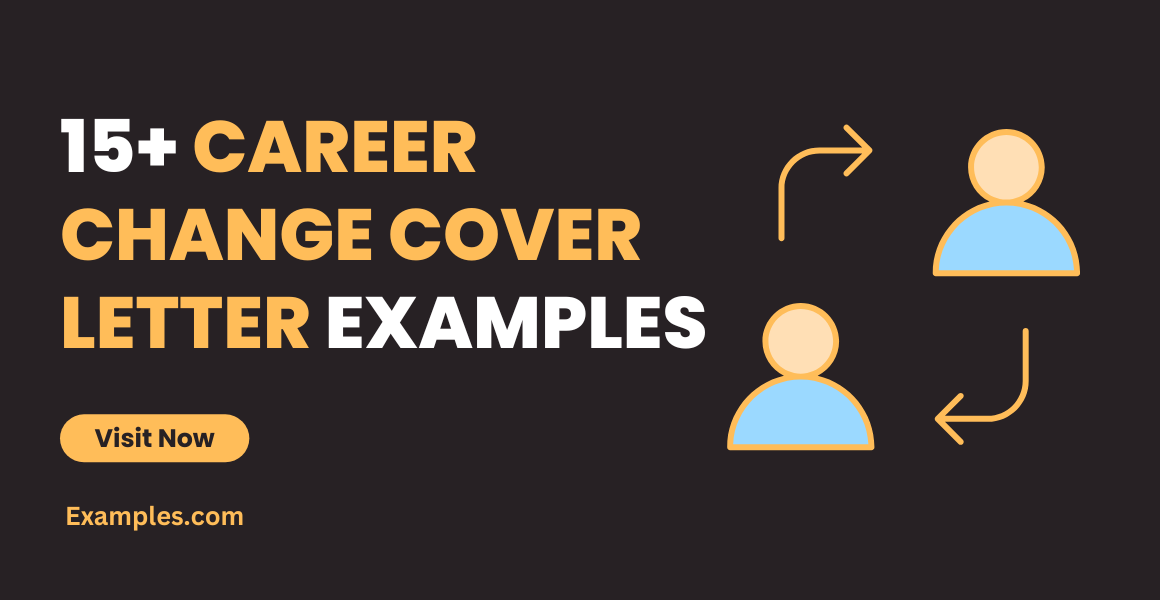
Shifting careers? Make your transition smooth with our guide on writing Career Change Cover Letters . This comprehensive guide presents practical examples and expert writing tips to help you demonstrate your transferable skills and convince employers of your potential in a new field. Crafting a compelling career change cover letter can be your stepping stone to exciting new opportunities. Let’s explore the benefits of a well-written career change cover letter and how it can set you apart from other applicants.
What is a Career Change Cover Letter? Definition
A Career Change Cover Letter is a specialized type of cover letter written by job seekers who are switching to a new industry or job role different from their previous experience. This document aims to highlight the transferable skills and knowledge the applicant possesses that make them a suitable candidate for the new role, despite not having direct experience in the field. It provides an opportunity for the applicant to explain their motivation for the career change and reassure employers of their potential and commitment to the new career path.
What is the Best Example of Career Change Cover Letter?
[Your Name] [Your Address] [City, State, ZIP] [Your Email Address] [Today’s Date]
[Employer’s Name] [Company Name] [Company Address] [City, State, ZIP]
Dear [Employer’s Name],
I am writing to express my interest in the [Job Title] position at [Company Name], as advertised on [where you found the job posting]. Although I have spent the majority of my career in [Current/Previous Industry], I am eager to transition into [New Industry] and I believe that my strong [mention specific skills] make me a promising candidate for this role.
In my current/previous role as a [Your Current/Previous Job Title] at [Your Current/Previous Company], I have [describe an achievement or responsibility that demonstrates relevant skills]. I believe this experience has prepared me well for the [Job Title] role at your company by demonstrating my ability to [mention a job requirement for the new role].
What attracts me to [New Industry] and specifically to your company is [explain your motivation for the career change and why you are interested in this company]. I am confident that my passion for [aspects of the new job] combined with my transferable skills make me a strong candidate for this role.
I would be thrilled to further discuss how my background and skills would allow me to contribute to your team. I am eager to bring my commitment and drive to succeed to this new opportunity. Thank you for considering my application.
Sincerely, [Your Name]
Remember to tailor this template to the specific job and company you’re applying to, and be sure to highlight transferable skills and explain your interest in the new industry.

Size: 27 KB
Free Career Change Cover Letters – Copy & Paste
Explore our selection of good career change cover letters that you can copy, paste, and customize to fit your needs. These examples are designed to highlight your transferable skills, showcase your enthusiasm for the new industry, and convince potential employers of your suitability, making your career transition a smoother process. Use these as a springboard to create your own compelling career change cover letters.
1. Career Change Cover Letter No Experience
Dear [Hiring Manager’s Name],
I am writing to express my interest in the [Job Title] position at [Company Name]. Although I have been working in [Current Industry], I am eager to transition to [Target Industry] and believe that my transferrable skills and eagerness to learn will make me an asset to your team.
In my current role as [Your Current Job Title], I have [mention a significant accomplishment or responsibility]. While these skills might not directly relate to [mention a responsibility of the target job], they demonstrate my ability to [mention a quality or trait required for the target job].
I am confident that my experience in [mention a transferrable skill or area of knowledge] and my passion for [mention an aspect of the target industry] make me a strong candidate for this position. I am excited to bring my unique perspective to the [Job Title] role at [Company Name], and look forward to the possibility of discussing my application further.
How to Use: This no experience cover letter is perfect for individuals who are looking to switch industries but have no experience in their target field. It emphasizes transferrable skills and motivation to learn, which are crucial when changing careers.
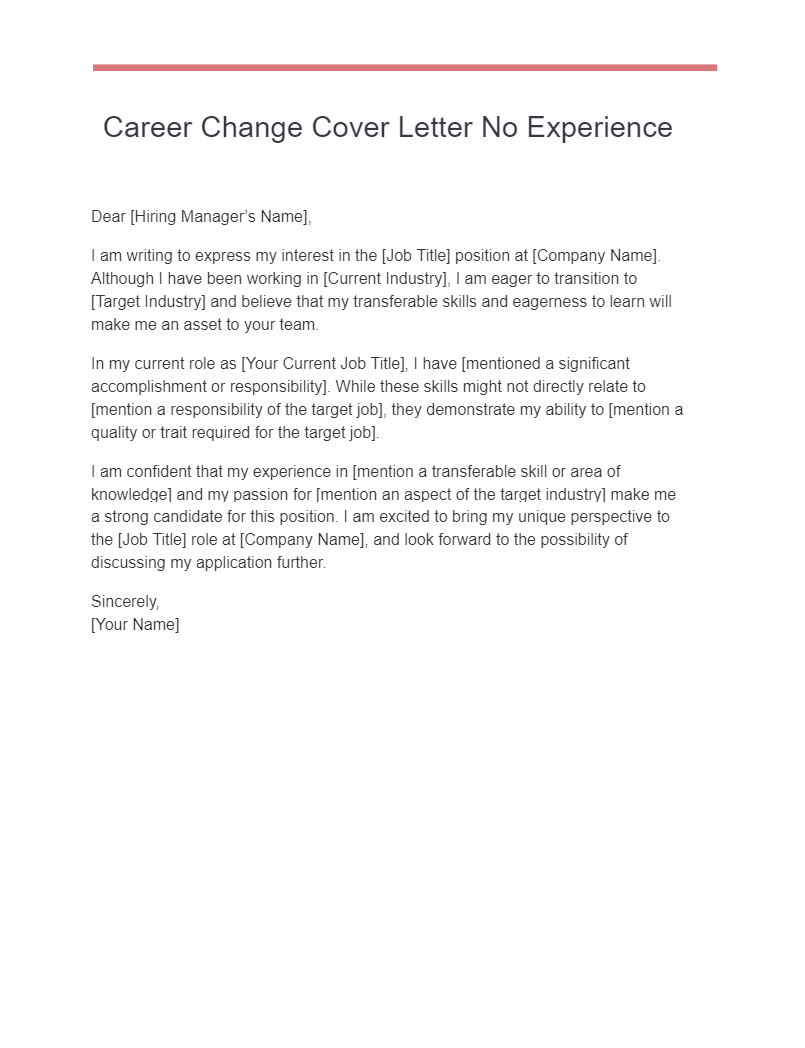
Size: 26 KB
2. Career Change Cover Letter for Human Resources
I am writing to express my interest in the [Job Title] position at [Company Name]. Having spent [Number of Years] in the [Current Industry], I am now keen to utilize my people management skills in a human resources capacity.
During my tenure as a [Your Current Job Title], I was frequently praised for my ability to handle complex situations with professionalism and a level-headed approach. I believe this skill, among others, makes me an ideal candidate for the position at your organization.
Your company’s reputation for [Company’s Best Feature] has always interested me, and I am confident that my experience in people management and my ability to [a specific HR related skill] can be an asset to your team.
Thank you for considering my application. I look forward to discussing my suitability for the position further.
How to Use: This hr cover letter is designed for professionals shifting into human resources. Highlight your people management skills, problem-solving capabilities, and willingness to learn new HR systems.
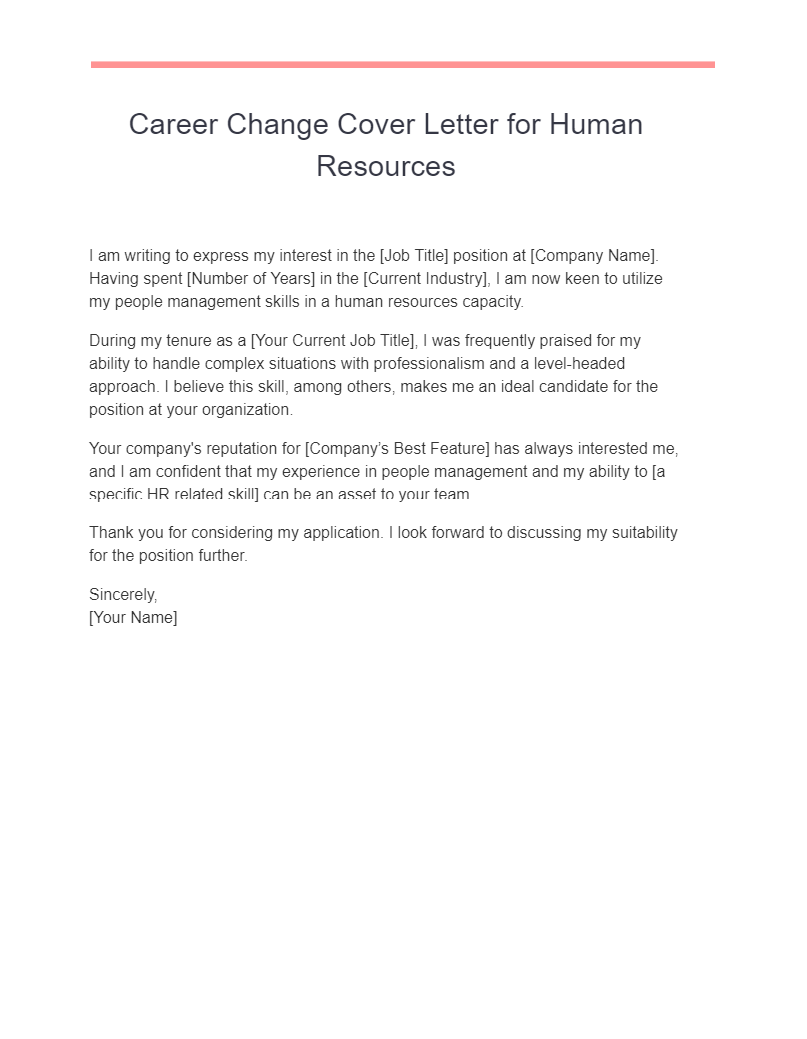
3. Career Change Cover Letter for Teachers
I am thrilled to apply for the [Job Title] position at [Company Name]. While my professional experience lies in [Current Industry], my passion for education and mentoring has driven me to pursue a career in teaching.
In my previous role as [Your Current Job Title], I consistently [mention a significant achievement or responsibility that demonstrates a key teaching skill—e.g. communication, empathy, creativity]. This experience, coupled with my desire to inspire young minds, makes me confident that I would bring a unique and valuable perspective to your team.
Thank you for considering my application. I am eager to have the opportunity to contribute to [Company Name], and I am ready to further discuss my qualifications in an interview.
How to Use: This teacher cover letter is ideal for professionals transitioning into teaching. Emphasize skills relevant to teaching such as communication, creativity, and patience, and express your passion for education.
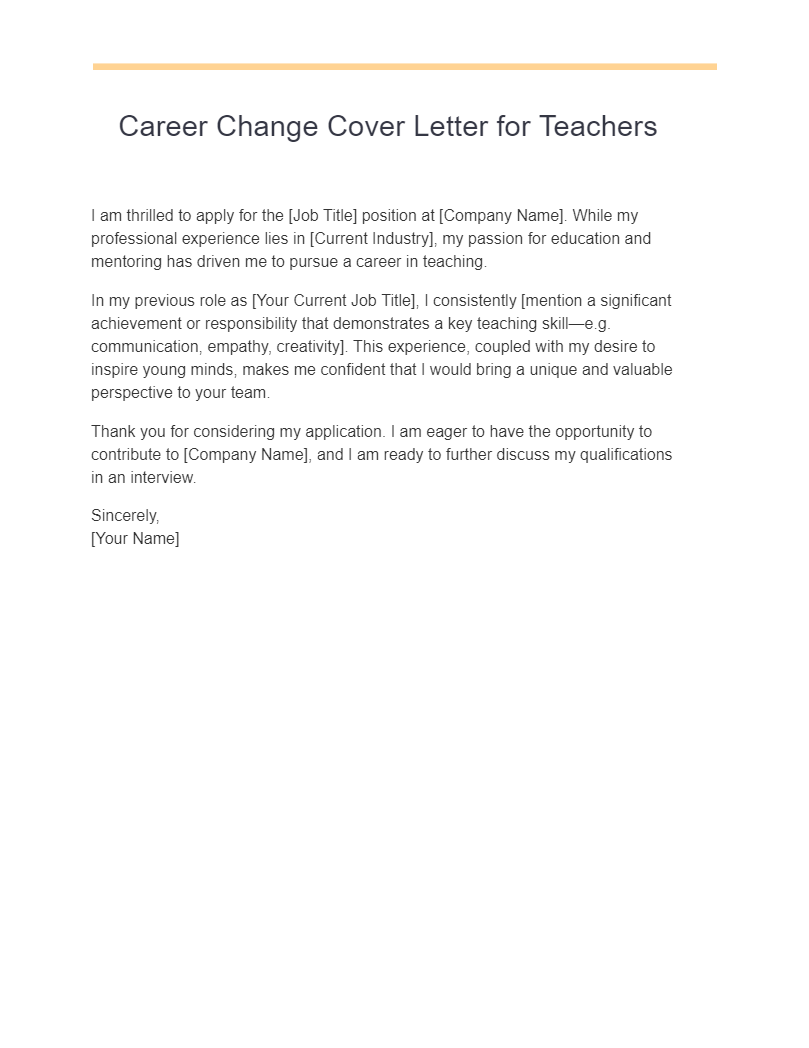
Size: 24 KB
4. Career Change Cover Letter for Administrative Assistant
I am eager to apply for the Administrative Assistant position at [Company Name]. Despite having spent most of my career in [Current Industry], I have always admired the organizational skills and multitasking abilities that Administrative Assistants exhibit.
In my current role as [Your Current Job Title], I have [describe an achievement or responsibility that demonstrates organizational skills or multitasking]. I am confident that these skills, along with my ability to work in a fast-paced environment, make me a strong candidate for this role.
I am thrilled about the opportunity to bring my unique skills to [Company Name] and support the team in any way I can.
Thank you for considering my application.
How to Use: This administrative assistant cover letter is for professionals transitioning into an administrative role. Highlight your organizational skills, multitasking abilities, and capacity to work in a fast-paced environment.
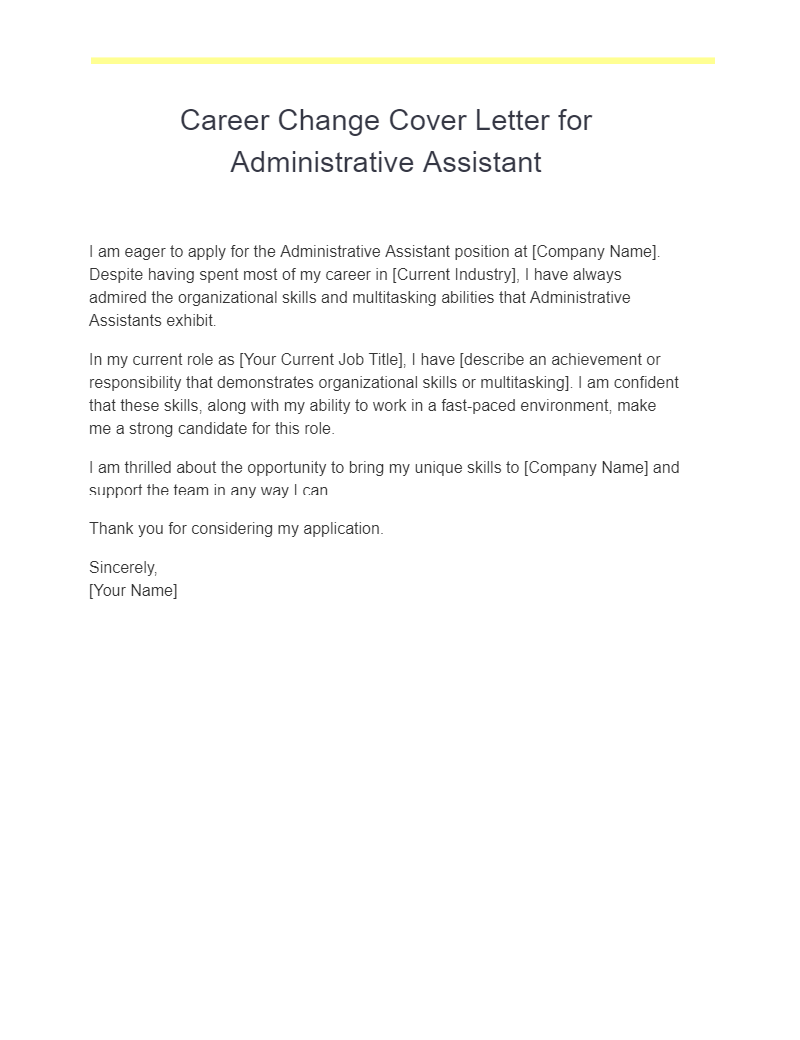
Size: 25 KB
5. Career Change Cover Letter for Job Opportunity
I am writing to express my interest in the [Job Title] position at [Company Name]. While I have greatly enjoyed my time in [Current Industry], I believe that this new opportunity aligns more closely with my long-term career goals.
Throughout my career as a [Your Current Job Title], I have developed key skills such as [mention a key skill] and [another key skill]. These skills, coupled with my enthusiasm for [Target Industry], make me a perfect fit for this role.
Thank you for considering my application. I look forward to the chance to discuss how my background and skills would benefit [Company Name].
How to Use: This job cover letter is designed for individuals who are seeking a career change due to new opportunities. It emphasizes key transferrable skills and enthusiasm for the new industry.
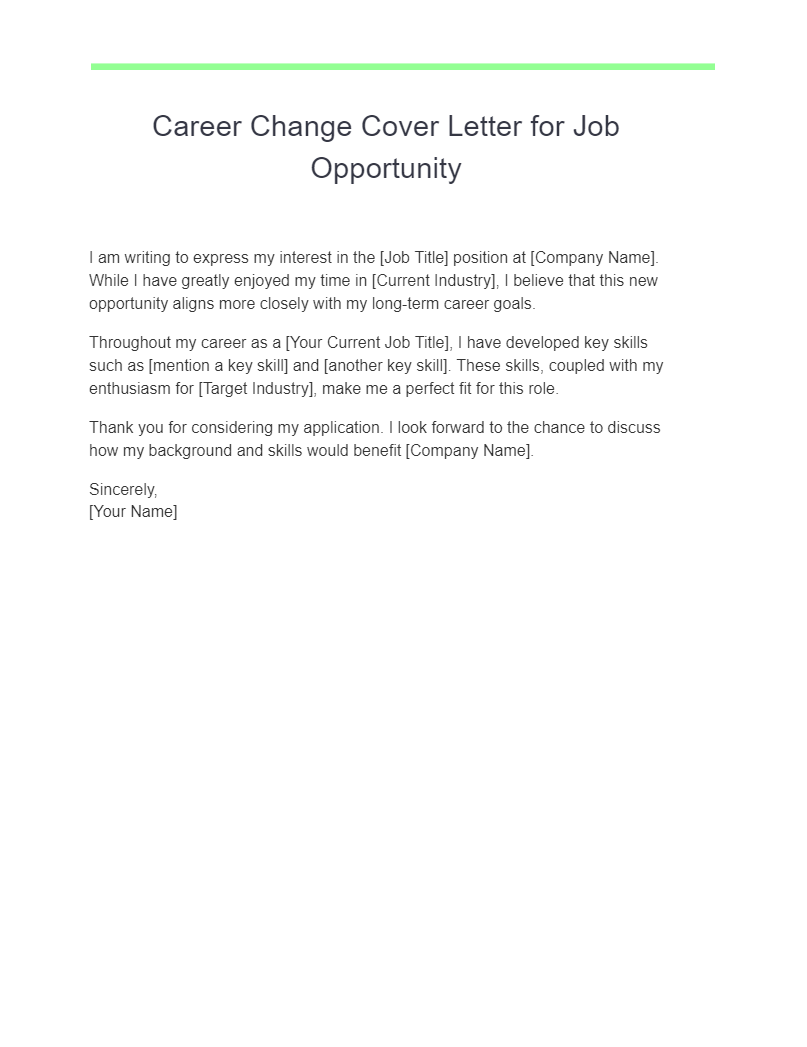
6. Career Transition Cover Letter
As an experienced [Your Current Job Title] in the [Current Industry], I have spent many years developing skills that I believe would be valuable in the [Target Industry]. This, coupled with my genuine interest in [Target Industry], has inspired me to apply for the [Job Title] position at [Company Name].
In my current role, I have gained [mention a transferrable skill or accomplishment] and have been recognized for my ability to [mention a quality relevant to the target job]. I am confident that these skills and experiences make me a strong candidate for this transition role.
Thank you for considering my application. I look forward to the opportunity to further discuss how I can contribute to your team.
How to Use: This template can be used by individuals who are seeking a significant career transition. It highlights transferrable skills and a genuine interest in the new industry.
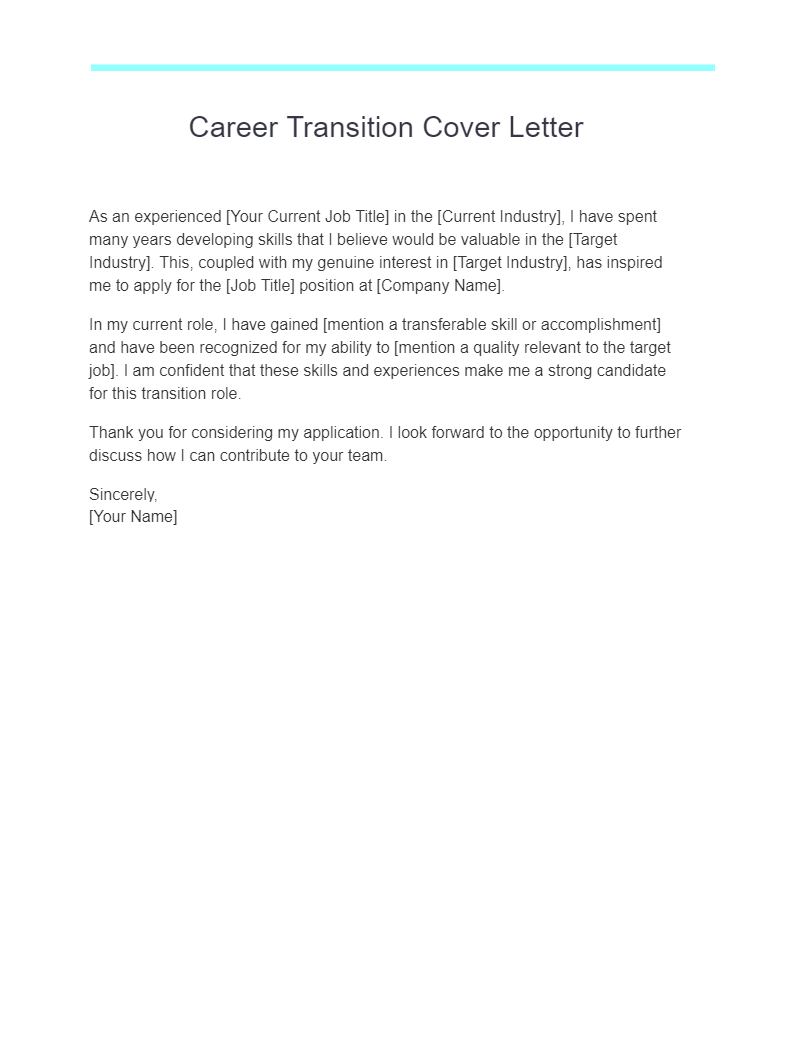
7. Career Change Cover Letter for Resume
I am writing to express my interest in the [Job Title] position at [Company Name]. While my resume outlines my experience in [Current Industry], I believe it’s important to highlight how my skills translate to the [Target Industry].
In my current role as [Your Current Job Title], I have developed a strong skill set, including [mention a key skill] and [another key skill], which I believe could greatly benefit your team. I am eager to bring my [mention a key quality or trait] to a new challenge in the [Target Industry].
Thank you for considering my application. I look forward to discussing my candidacy further.
How to Use: This cover letter for resume specifically emphasizes the skills on your resume that are most relevant to the new industry you are targeting. It allows you to further elaborate on how these skills can be beneficial in your new role.
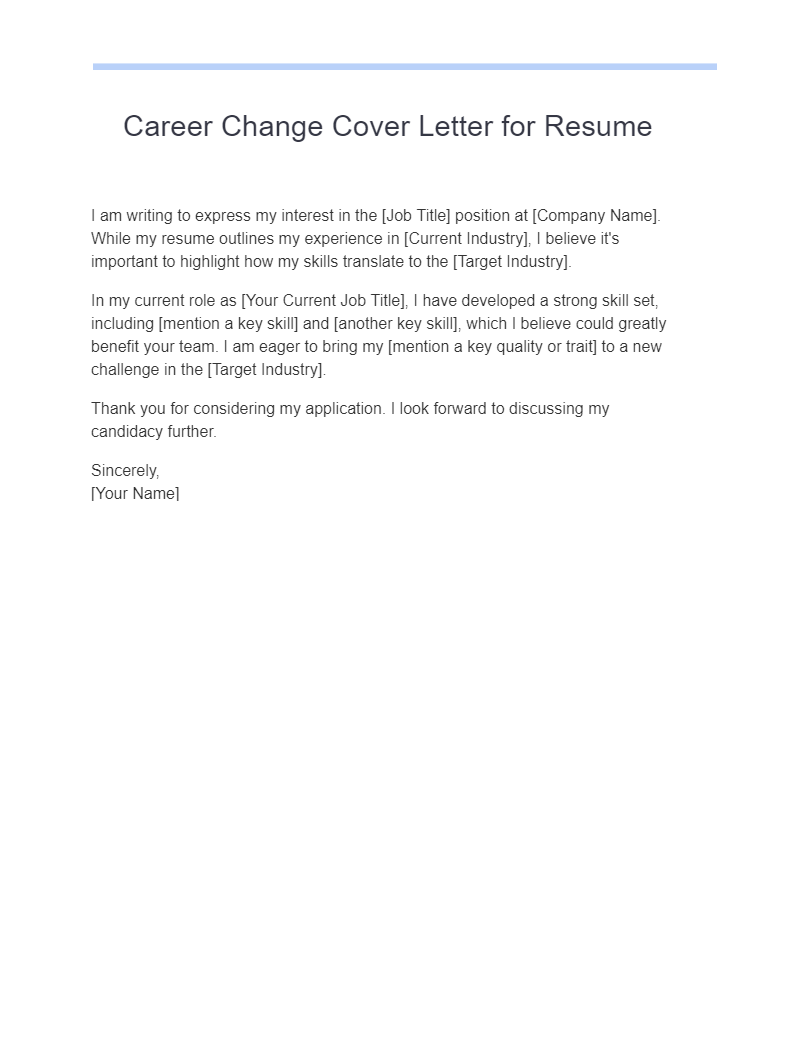
8. Professional Career Change Cover Letter
I am writing to apply for the [Job Title] position at [Company Name]. After [Number of Years] in the [Current Industry], I am now seeking to leverage my professional experience into the [Target Industry].
Throughout my career, I have consistently demonstrated my strong [mention a transferrable skill or quality], which has contributed to my success in [Current Industry]. I am confident that these skills, combined with my knowledge and passion for [Target Industry], make me a strong candidate for this position.
I would welcome the opportunity to further discuss my suitability for this role. Thank you for considering my application.
How to Use: This professional cover letter example is suitable for seasoned professionals seeking a career change. It allows you to highlight key professional skills that are transferrable to your new industry.
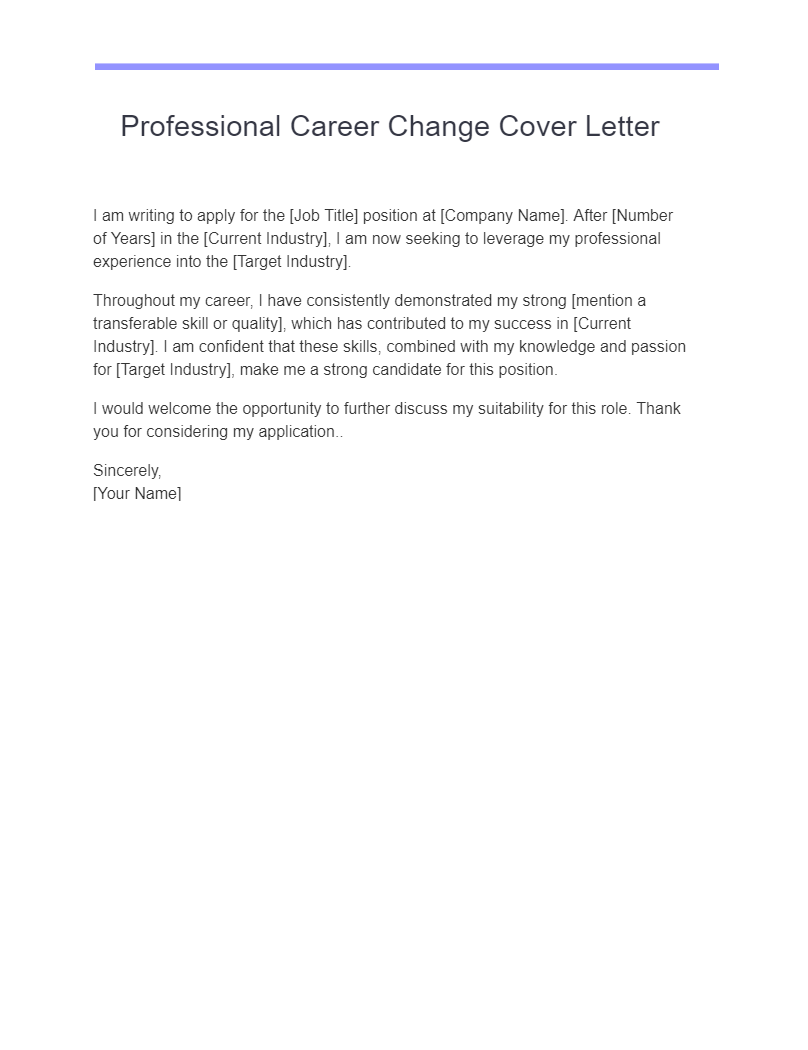
Size: 23 KB
9. Short Career Change Cover Letter
I am eager to apply for the [Job Title] position at [Company Name]. While my experience has been in [Current Industry], I have always been interested in [Target Industry] and have been actively developing my skills in this area.
In my current role as [Your Current Job Title], I have developed valuable skills such as [mention a key skill] and [another key skill]. I believe these skills would greatly benefit your team.
Thank you for considering my application. I look forward to further discussing my suitability for this position.
How to Use: This brief cover letter is perfect for professionals who prefer a more succinct approach. It highlights your interest in the new industry and the key skills you have developed in your current role.
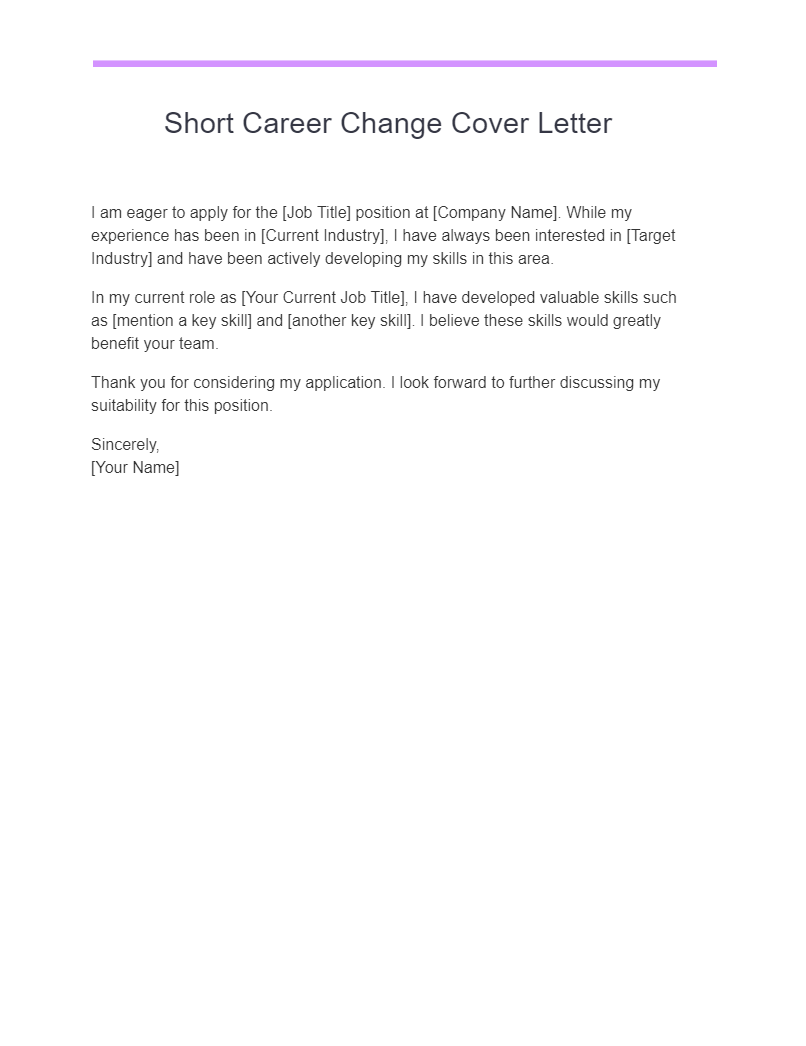
10. Career Change Cover Letter for Nursing Job
As a [Your Current Job Title] with a genuine passion for healthcare, I am excited to apply for the nursing position at [Company Name]. Though my career has been in the [Current Industry], I have always felt a calling towards nursing.
Throughout my career, I have consistently been recognized for my [mention a quality or trait relevant to nursing]. In addition, I have completed [mention any relevant training or certifications]. I believe these qualities, along with my passion for healthcare, make me an excellent candidate for this role.
Thank you for considering my application. I am eager to further discuss my qualifications.
How to Use: This nurse cover letter template is suitable for individuals transitioning into nursing. It showcases your relevant qualities, training, and passion for healthcare.
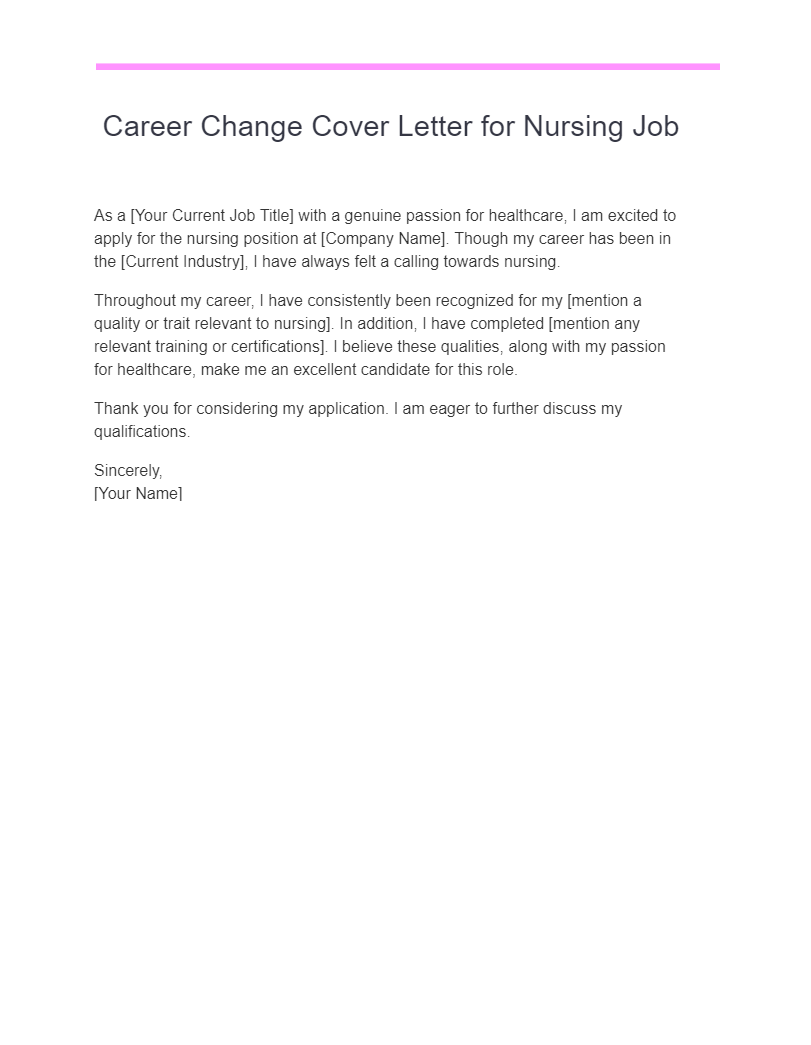
11. Career Change Cover Letter for Job Application
As a seasoned professional in the [Your Current Job Title], I am eager to apply my skills and experiences to a new challenge in the [Target Industry]. I am writing to express my interest in the [Job Title] position at [Company Name].
Over the years, I have developed skills and qualities such as [mention a key skill] and [another key skill]. These, I believe, will greatly benefit your team. I look forward to bringing my [mention a key quality or trait] to this role.
Thank you for considering my application. I am eager to discuss how I can contribute to your team.
How to Use: This job application cover letter is a perfect fit for a professional transitioning to a new industry. It highlights key skills and qualities that can be beneficial to the new role.
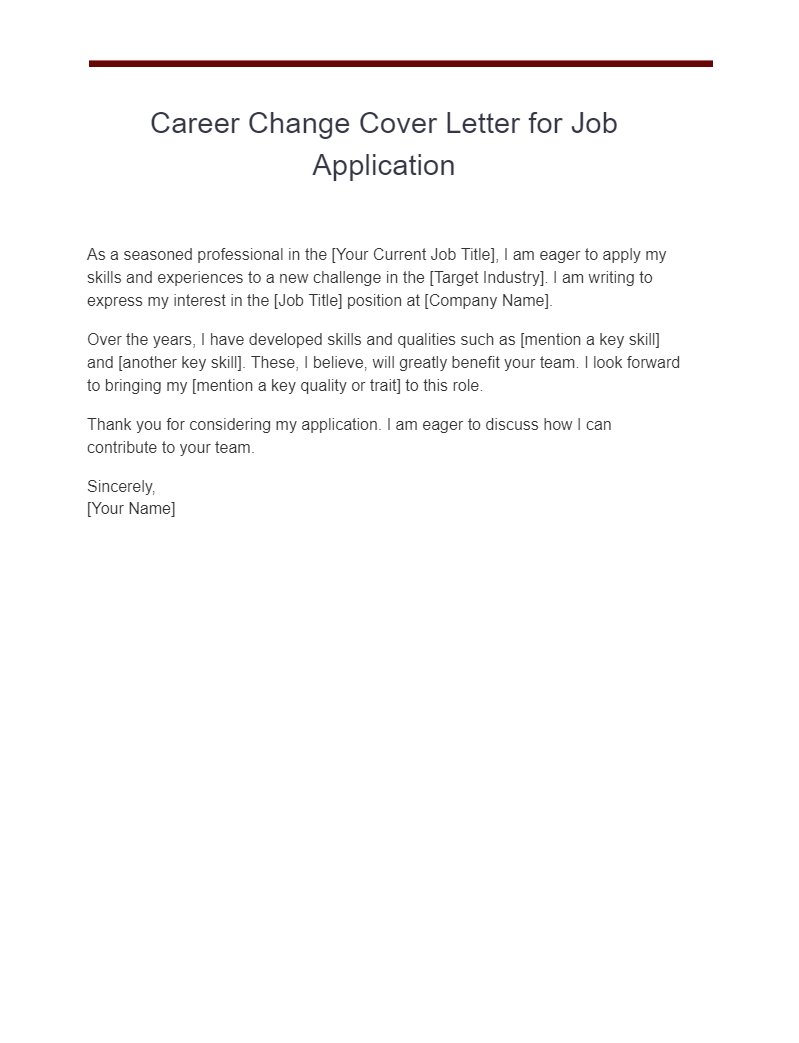
12. Career Switch Cover Letter
I am writing to express my interest in the [Job Title] position at [Company Name]. With a successful career in [Current Industry] under my belt, I am eager to take on a new challenge in the [Target Industry].
I bring with me skills such as [mention a key skill] and [another key skill]. These skills, coupled with my [mention a key quality or trait], make me a strong candidate for this position.
Thank you for considering my application. I look forward to further discussing my qualifications.
How to Use: This cover letter is a perfect fit for professionals looking to switch industries. It emphasizes transferable skills and the readiness to take on new challenges.
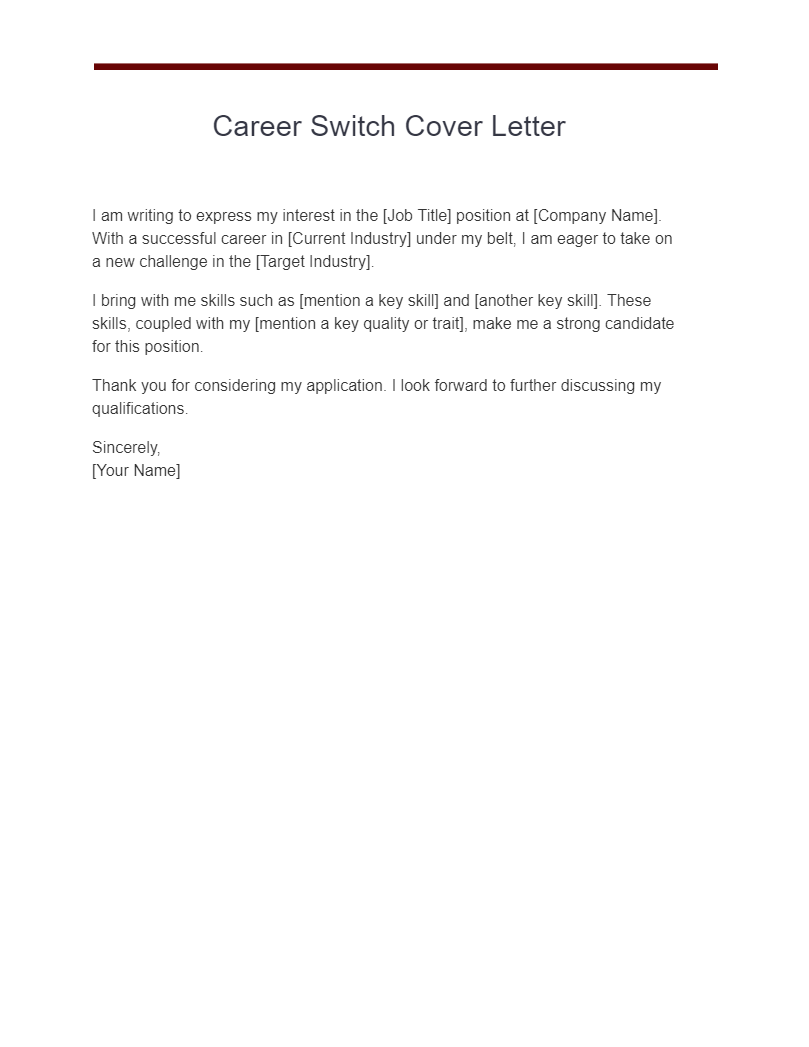
13. Persuasive Career Change Cover Letter
I am writing to apply for the [Job Title] position at [Company Name]. After [Number of Years] in the [Current Industry], I have developed a robust set of skills that I believe are highly transferable to the [Target Industry].
In my current role, I have proven my ability to [mention a major achievement or skill]. These accomplishments, coupled with my passion for [Target Industry], make me a strong candidate for this role.
Thank you for considering my application. I am eager to further discuss my suitability for this role.
How to Use: This cover letter is highly persuasive, showcasing key achievements and passion for the new industry. It’s perfect for professionals who are confident about their transferable skills.
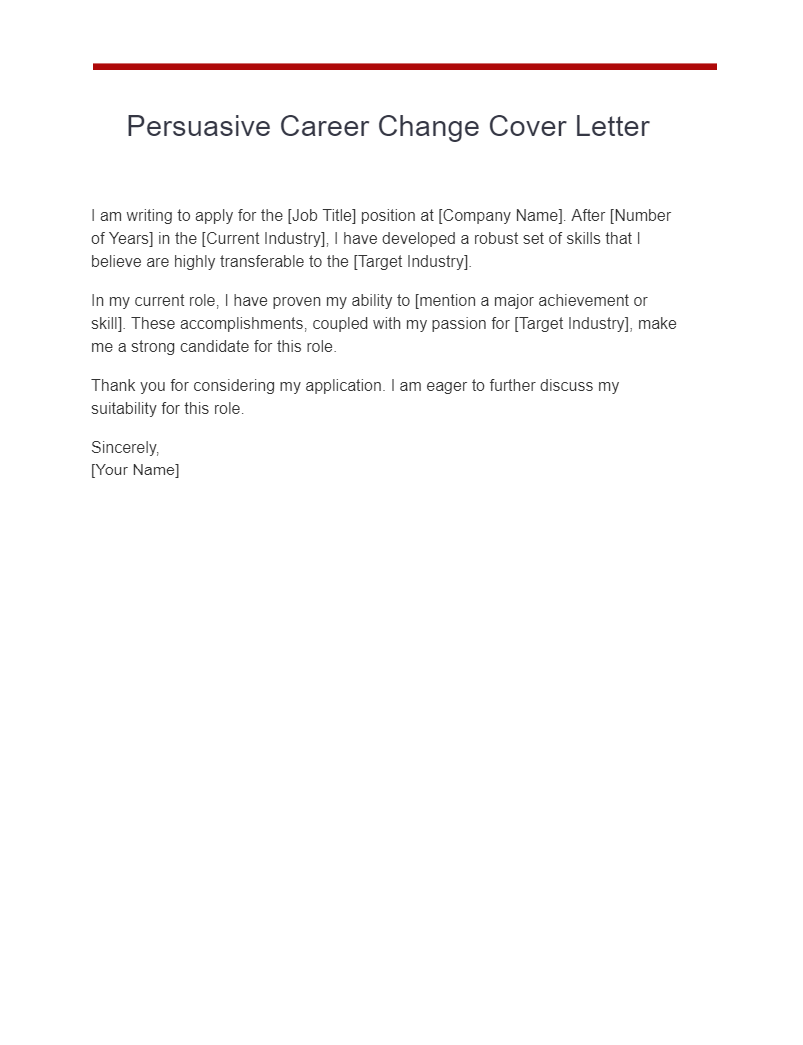
14. Career Change Cover Letter for Manager
I am writing to express my interest in the [Job Title] position at [Company Name]. With a successful managerial career in the [Current Industry], I am ready to leverage my leadership skills in the [Target Industry].
Throughout my career, I have developed and honed skills such as [mention a key skill] and [another key skill], both of which are crucial for a managerial role in any industry. I am confident that these skills, combined with my leadership experience, will prove beneficial in this new role.
Thank you for considering my application. I look forward to discussing my qualifications further.
How to Use: This manager cover letter is suitable for managers seeking a career change. It highlights leadership skills and other transferable skills that will prove beneficial in a managerial role in a new industry.
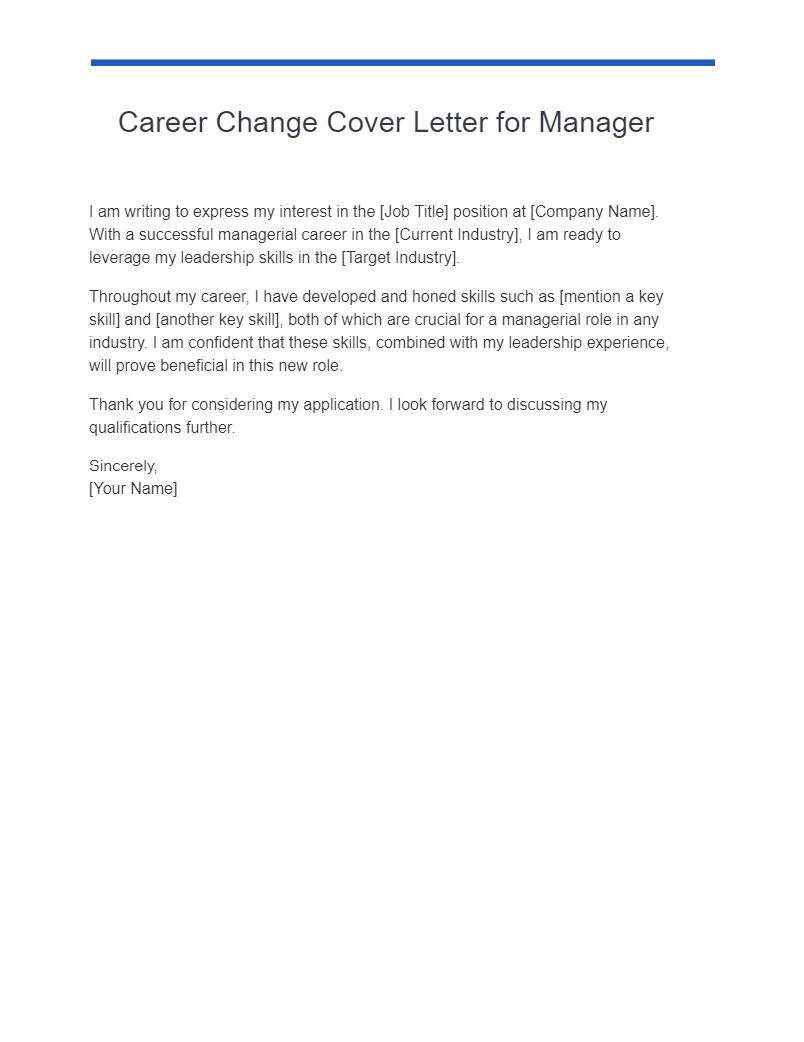
15. Career Change Cover Letter for Information Technology
I am excited to apply for the [Job Title] position at [Company Name]. Though my experience has been in the [Current Industry], I have always had a keen interest in the dynamic field of information technology.
In my current role as [Your Current Job Title], I have honed skills such as [mention a key skill] and [another key skill]. I have also pursued additional training in [mention any IT-related training or certifications you’ve obtained]. I believe that these skills and qualifications make me a strong candidate for this role.
Thank you for considering my application. I am eager to discuss my qualifications further.
How to Use: This template is ideal for individuals transitioning into the IT industry. It emphasizes interest in the field, relevant skills, and any additional IT-related training or certifications.
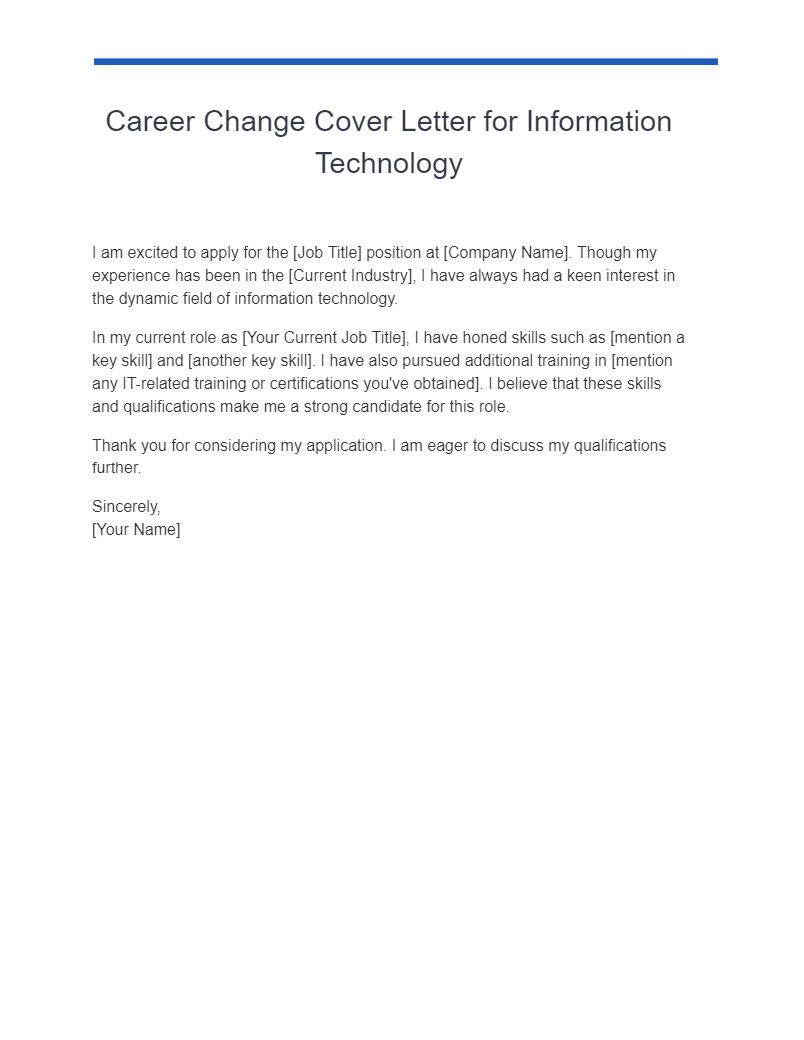
Career Change Statement Examples
1. “Leveraging a 10-year track record in team leadership, project coordination, and interpersonal communication from the hospitality industry to drive outcomes and increase efficiency in the healthcare sector.”
2. “Seeking to apply my extensive experience in financial management and strategic planning to the dynamic field of healthcare administration.”
3. “Transitioning from a successful career in real estate, where I developed skills in client relationship management and contract negotiation, to the high-growth e-commerce industry.”
4. “Leveraging a deep understanding of software development acquired during my time in the tech sector, I am keen on applying these skills to the burgeoning field of FinTech.”
5. “After spending several years in the marketing industry, I am looking to leverage my creative thinking and strategic planning skills in a career in urban planning and development.”
6. “Seeking to apply my background in customer service to a career in Human Resources, bringing excellent communication skills, empathy, and conflict resolution expertise.”
7. “With a proven track record in sales and business development, I am eager to bring my leadership skills and drive for results into the nonprofit sector to drive mission-driven outcomes.”
8. “Transitioning from a career in academic research to industry, eager to apply problem-solving abilities, analytical skills, and a keen understanding of data analytics.”
9. “Following a successful career in the military, I am eager to transition into civilian project management roles, leveraging strong leadership, discipline, and strategic planning skills.”
10. “After a rewarding career in teaching, I am looking to use my skills in presentation, leadership, and mentorship in a corporate training role.”
How Do I Write a Cover Letter for a Change in my Career?
Writing a cover letter for a career change can be somewhat daunting, but it is an opportunity to showcase your transferable skills, demonstrate your passion for the new industry, and explain why you are making this change.
1. Opening: Start by addressing the hiring manager and expressing your enthusiasm for the position. Highlight your current profession and mention your intention to transition into the new industry.
2. Body: In the main body, focus on transferable skills, drawing parallels between what you’ve done and what the new role requires. Also, illustrate with examples where you’ve applied these skills. Be sure to relate these skills to the job requirements.
3. Concluding: Conclude by reiterating your interest in the new field and the specific job you’re applying for. Show gratitude for their consideration and express your eagerness to discuss further in an interview.
How Do You Say You Need a Change in Career?
When explaining your need for a career change, it’s essential to communicate your reasons in a positive and professional manner. Here are a few examples:
1. “I am eager to transition into an industry that better aligns with my professional interests and personal values.” 2. “I am seeking a new challenge that will enable me to leverage my skills and experience in a different context.” 3. “I have developed a strong interest in [target industry] and I am excited about the opportunity to apply my [transferable skills] in this new area.”
Avoid speaking negatively about your current or past industry or employers. Keep the focus on your professional growth and the opportunities that the career change offers.
Tips for Career Change Cover Letter
1. Highlight Transferable Skills: Identify the skills that are relevant to the new industry or role and provide examples that demonstrate these skills in action.
2. Show Passion: Demonstrate your enthusiasm and commitment for the new industry. Show that you are motivated and ready to transition.
3. Emphasize Soft Skills: Soft skills like communication, leadership, problem-solving, and adaptability are valuable in many fields.
4. Explain Your Reasons: Briefly explain why you’re making the change. Your reasons should be positive and focused on your future career growth.
5. Customize Your Cover Letter: Tailor each cover letter to the specific role and company. This shows the employer that you’ve done your research and understand what the role entails.
6. Address Any Gaps or Concerns: If you think the employer may have reservations about your application, address these proactively in your cover letter. Explain any gaps in employment or lack of direct experience in a positive way.
7. End Strongly: Finish your letter by summarizing why you’re a good fit for the role and expressing your enthusiasm for the opportunity to interview. This leaves a strong impression and propels the hiring manager to consider your application seriously.
Text prompt
- Instructive
- Professional
Write a cover letter for a college student applying for an internship at an educational technology company
Form a cover letter for a high school student seeking a part-time job at a local bookstore.

3 Strong Career Change Cover Letter Examples & Templates
By Status.net Editorial Team on October 11, 2024 — 6 minutes to read
A strong career change cover letter highlights your transferable skills and explains your motivation for switching paths. You want to connect your past experience to the new role you’re seeking. This shows employers how you’ll add value, even without direct industry experience. In this article you will find effective cover letter examples and templates can guide you in crafting your own. With the right approach, you can convince hiring managers to take a chance on you in your new career.
Your career change cover letter helps employers see past job titles and focus on your transferable skills.
Career Change Cover Letter Templates and Examples
Template 1:.
Dear [Hiring Manager’s Name],
I’m excited to apply for the [Position] role at [Company]. While my background is in [Current Field], I’ve developed skills in [Relevant Skill 1] and [Relevant Skill 2] that translate well to [New Field].
[Give a brief example of how you’ve used these skills]
I’m eager to bring my unique perspective to [Company] and contribute to [specific company goal or project].
Best regards, [Your Name]
Example for Template 1:
Dear Ms. Johnson,
I’m excited to apply for the Marketing Coordinator role at TechNow. While my background is in teaching, I’ve developed skills in communication and data analysis that translate well to marketing.
I’ve created engaging lesson plans and analyzed student performance data to improve outcomes. These skills will help me craft compelling marketing messages and measure campaign effectiveness.
I’m eager to bring my unique perspective to TechNow and contribute to your upcoming product launch.
Best regards, Jamie Smith
Template 2:
I’m writing to express my interest in the [Position] role at [Company]. I’m making a career change from [Current Field] to [New Field] because [brief explanation of your motivation].
[Highlight a relevant accomplishment or experience]
I’m excited about the opportunity to [contribute to a specific aspect of the role or company].
Thank you for your consideration, [Your Name]
Example for Template 2:
Dear Mr. Johnson,
I’m writing to express my interest in the Graphic Designer role at Visionary Creative. I’m making a career change from teaching to graphic design because I’ve always been drawn to the power of visual communication and its ability to inspire and engage people.
As a hobby, I’ve designed logos and marketing materials for several small businesses in my community, receiving praise for my creativity and attention to detail.
I’m excited about the opportunity to contribute to Visionary Creative’s mission of helping brands stand out through innovative and impactful design.
Thank you for your consideration, Emily Davis
Template 3:
I am excited to apply for the [Position] role at [Company]. Although my background is in [Current Field], I am confident that my skills and experiences are transferable to [New Field].
In my current role as [Current Job Title], I have developed [relevant skills or experiences]. I believe these qualities would enable me to [contribute to the new role or company in a specific way].
Moreover, I have taken steps to prepare for this career transition by [list relevant courses, certifications, or projects].
I am enthusiastic about the opportunity to bring my [specific skills or attributes] to [Company] and contribute to [a specific aspect of the company’s mission or goals].
Thank you for considering my application. I look forward to the opportunity to discuss further how my unique perspective and skills can benefit [Company].
Example for Template 3:
I am excited to apply for the Human Resources Coordinator role at Thrive Enterprises. Although my background is in customer service, I am confident that my skills and experiences are transferable to human resources.
In my current role as a Customer Service Team Leader, I have developed strong communication, problem-solving, and leadership skills. I believe these qualities would enable me to excel in managing employee relations and supporting HR initiatives.
Moreover, I have taken steps to prepare for this career transition by completing an online course in Human Resources Management and obtaining my certification.
I am enthusiastic about the opportunity to bring my interpersonal skills and dedication to employee well-being to Thrive Enterprises and contribute to creating a positive and inclusive work environment.
Thank you for considering my application. I look forward to the opportunity to discuss further how my unique perspective and skills can benefit Thrive Enterprises.
Best regards, Alex Wilson
Example Phrases
Opening statements.
Your opening sets the tone for your whole letter:
- “I’m excited to apply for the Marketing Manager position at (…) Company.”
- “Your job posting for a Graphic Designer caught my eye on LinkedIn.”
- “As a passionate educator, I’m thrilled to apply for the Teaching position at (…) School.”
- “I was impressed by your company’s recent sustainability initiatives and would love to join your team.”
- “My 10 years of sales experience make me a great fit for the Account Executive role.”
- “I’m writing to express my interest in the Social Media Manager position at your firm.”
- “Your company’s innovative approach to healthcare inspired me to apply for the Nurse Practitioner role.”
- “I’m eager to bring my project management skills to the Construction Supervisor position.”
- “As a recent graduate in Environmental Science, I’m excited about the Research Assistant opening.”
- “Your reputation for excellent customer service drew me to apply for the Customer Support Representative role.”
Convincing Conclusion and Call to Action
End your letter with a strong finish. You can include a clear call to action, like asking for an interview:
- “I’m excited about the opportunity to contribute to your team and would welcome the chance to discuss this role further.”
- “Thank you for considering my application. I look forward to speaking with you about how I can add value to your organization.”
- “I’m confident my transferable skills and enthusiasm make me a great fit for this position. I’d love to meet and discuss how I can contribute to your team’s success.”
- “I’m eager to bring my unique blend of skills and experience to your company. Please let me know if you need any additional information.”
- “I believe my background aligns well with your needs, and I’m excited about the possibility of joining your team. I hope we can schedule an interview soon.”
- “Thank you for your time and consideration. I look forward to the opportunity to further discuss how I can contribute to your company’s goals.”
- “I’m passionate about this field and I hope we can arrange a time to talk more about this exciting opportunity.”
- “I’m excited about the possibility of joining your innovative team and would appreciate the opportunity to speak with you further about this role.”
- “Thank you for reviewing my application. I’m looking forward to the next steps in the process and the chance to discuss how I can contribute to your organization’s mission.”
The Importance of a Career Change Cover Letter
A career change cover letter helps you explain why you’re switching fields. It’s your chance to make a strong first impression on potential employers.
- This letter shows how your skills from your old job fit the new role you want. You can highlight experiences that match what the company needs.
- You can use the letter to address any gaps in your work history. Related: 8 Examples: Confidently Explain Employment Gaps on Your Resume
- You can explain how you’ve prepared for the career switch through classes, volunteering, or side projects.
- You can share what drew you to this new field and how it aligns with your goals.
- Try to tailor each cover letter to the specific job and company.
- 45 Strong Career Change Statement Examples
- 3 Inspiring Nonprofit Cover Letter Examples
- Resume vs. Cover Letter (Thoughtful Tips)
- 60 Examples of Strong Closing Statements: How to Close a Cover Letter
- 5 Compelling Examples of Cover Letter for Warehouse Job
- 5 Key Parts of an Effective Cover Letter (with Examples)

VIDEO
COMMENTS
For example, if you have proficiency with a certain software you know is used in your new role and/or industry, be sure to include it in your resume and cover letter. ... Volunteering or taking online classes in a specific industry can help you build your new resume and cover letter. Sometimes, requesting a transfer between departments within ...
I know, drafting a cover letter—let alone a compelling one—can be stressful and time-consuming. But cover letters are a potent secret weapon for career changers. While resumes can be a great way to showcase your work experience, cover letters give you the opportunity to explain how that experience will help you excel in your next role.
Crafting a compelling career change cover letter requires showcasing your transferable skills, highlighting relevant experiences, and expressing your passion for your new chosen field. By tailoring your cover letter to the specific requirements of the role and organization, you can demonstrate your unique value proposition and make a strong ...
Example: General Career Change Cover Letter. Dear [Hiring Manager's Name], I am excited to apply for the [Position] at [Company], transitioning from a career in [Current Industry] to [New Industry].
Tailor Your Cover Letter to the New Industry Show Clear Relevance. Utilizing the knowledge gained from your research, craft your cover letter to explain how your skills and experiences are relevant to the targeted position. Highlight specific projects or accomplishments that echo the expectations of the new industry role. Be sure to align your ...
1. Write an attention-grabbing introduction. Hiring managers have a limited amount of time to spend on each job application. So, don't start your cover letter by drawing attention to your lack of experience with self-deprecating phrases like "I may be unqualified, but…". You don't want to make a negative impression on employers before they've gotten the chance to learn why you're ...
A Career Change Cover Letter is a specialized type of cover letter written by job seekers who are switching to a new industry or job role different from their previous experience. This document aims to highlight the transferable skills and knowledge the applicant possesses that make them a suitable candidate for the new role, despite not having ...
A strong career change cover letter highlights your transferable skills and explains your motivation for switching paths. You want to connect your past experience to the new role you're seeking. This shows employers how you'll add value, even without direct industry experience. In this article you will find effective cover letter examples and templates can...
Your cover letter allows you to address these concerns and show why you're committed to your new career path. 2. Structure of a Career Change Cover Letter. The structure of a career change cover letter is similar to that of a traditional cover letter, but with a few modifications to address your career transition. Here's the format:
Here’s our cover letter template specifically designed for people looking for a career change: ... a key part of your success will be convincing employers you're the right fit for your new role - even if your previous experience in the industry is limited. ... Having worked my way up to Regional Sales Manager, I'm ready for a new ...